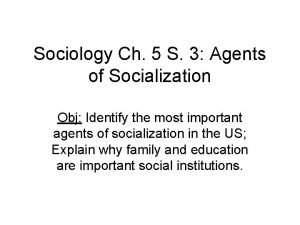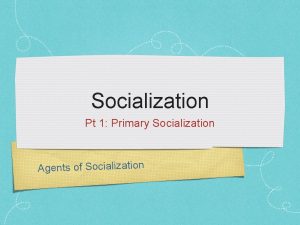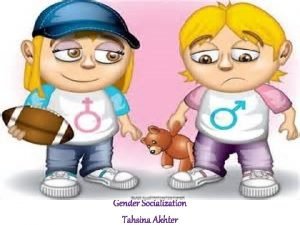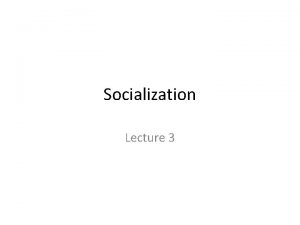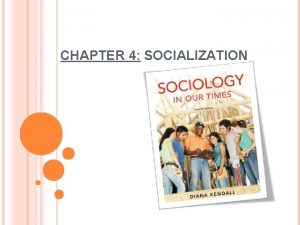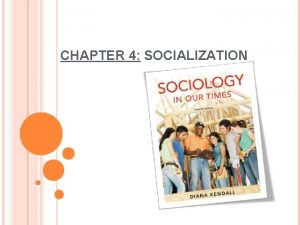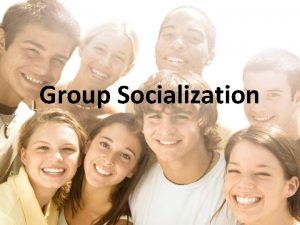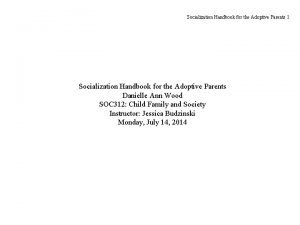Socialization Pt 1 Primary Socialization Agents of Socialization














- Slides: 14

Socialization Pt 1: Primary Socialization Agents of Socialization

Socialization Primary Socialization: the life-long process through which humans learn the skills and attitudes they need to function in society Socialization is different based on race, gender and class

Socialization What is the goal of socialization? -to turn us into conforming members of society Consequences of socialization Creates the capacity for role taking Creates the tendency for people to act in socially acceptable ways

Family School Social Groups Peers Agents of Socialization Ethnic Backgrou nd Religion Governm ent Media

Family Families introduce children to the expectations of society. How parents define and treat a child is crucial to the development of the child’s sense of self. Some families emphasize educational achievement; some may be more permissive, whereas others emphasize strict


School is the first agent to make us deal with formal rules It is also the first place where we are looked after by officials who are not our family members Teaches us two things: 1)Manifest function – teach us the academic skills we need to prosper in society 2)Latent function (Hidden Curriculum) – to socialize us to understand co-operate with strangers, gender roles, being on time, being neat, etc.

Peers For children, peer culture is an important source of identity. Through interaction with peers, children learn concepts of self, gain social skills, and form values and attitudes. Girls’ peer groups tend to be closely knit and egalitarian. Boys’ peer groups tend to be more hierarchical, with evident status distinctions

Media The average young person (age 8– 19) spends 6. 75 hours per day immersed in media in various forms, often using multiple media forms simultaneously. Television is the dominant medium, although half of all youth use a computer daily. Analysts estimate that by age 18, the average child will have witnessed at least 18, 000 simulated murders on television.

SURVEY Poll: Which media source do you think has the strongest impact on attitudes and behaviours of your generation? Advertising Television Music and music videos The Internet Magazines

Religion Children tend to develop the same religious beliefs as their parents. Very often those who disavow religion return to their original faith at some point in their life, especially if they have strong ties to their family of origin and after they form families of their own. Religious socialization also influences beliefs about sexuality, including the likelihood of tolerance for gay and lesbian sexuality.

Sports Through sports, men and women learn concepts of self. Men learn that being competitive in sports is considered a part of “manhood. ” Current research finds that women in sports develop a strong sense of bodily competence, which is typically denied to them by the prevailing cultural images of women’s bodies.

SURVEY Which agent of socialization do you think is the most responsible for gender differences in how males and females are socialized? The family Religion The peer group Education Mass media

Socialization Across Life Cycle Childhood - establish identity and values. Adolescence - form a consistent identity. Adulthood and Old Age - learn new roles and expectations in adult life.
 Definition of agent of socialization
Definition of agent of socialization 6 agents of socialization
6 agents of socialization Types of socialisation
Types of socialisation Agents of socialization sociology definition
Agents of socialization sociology definition 3 agents of socialization
3 agents of socialization Agents of socialization
Agents of socialization Define agents of socialization
Define agents of socialization Definition of agent of socialization
Definition of agent of socialization The primary pigments are _____ the primary colors.
The primary pigments are _____ the primary colors. Pollinating agents example
Pollinating agents example Balanced anesthesia components
Balanced anesthesia components Occlusion and mixed-crystal formation
Occlusion and mixed-crystal formation Examples of non-quick breads
Examples of non-quick breads 3 examples of drop batters
3 examples of drop batters Physical agents for controlling microbial growth
Physical agents for controlling microbial growth



